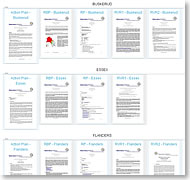Briefing Paper 13
| Attachment | Size |
|---|---|
| 13- PURE_Briefing_Paper_-_PURE_Clusters.pdf | 46.62 KB |
Embedded Scribd iPaper - Requires Javascript and Flash Player
Observatory PASCAL
Place Management, Social Capital and Learning Regions PASCAL UNIVERSITIES REGIONAL ENGAGEMENT PROJECT (PURE) PURE Briefing Paper No. 13 And Regional Advisory Network Consultation PURE Clusters
Special interest clusters of regions focusing attention on shared subjects of particular interest are part of the design of the PURE project. They have been a subject for consideration within each Region, and were considered on the occasion of CDG visits to the Regions earlier this year. Choice of clusters was an important topic for the Vancouver Workshop in May. The subject was followed up in Briefing Paper 12, which also asked Regions for their Action Plans. This Briefing Paper updates Participating Regions on Cluster interest, as identified in correspondence following the issuing of BP 12 asks each region to respond as appropriate to the questions raised in the second part of the Paper.
A.
The Current Clusters Situation Seven possible Clusters have attracted interest so far. Of these, five are clearly viable. The other two are marginal at present, but it is likely that when the remaining regions express their preferences, all seven may be viable. The position at the end of July is as follows. Subjects are listed in current interest and demand order and numbered in this order for convenient reference. Cluster 1: Regional Innovation and Renewal (8) Buskerud Essex Flanders Gabarone Kent Jamtland Melbourne (Coordinating Region – David Campbell) South Transdanubia
Cluster 2: Social Inclusion and Active Citizenship (6) Darling Downs Flanders (Coordinating Region – individual TBA) Kent Lesotho Melbourne Northern Illinois
http://www.obs-pascal.com/ Page |1
PURE BP No. 13
Observatory PASCAL
Place Management, Social Capital and Learning Regions Cluster 3: Creative and Cultural Industries (5) Buskerud? Flanders Gaborone Kent Jamtland
Cluster 4: Green Skills and Jobs (4) Essex Kent Melbourne Northern Illinois (Coordinating Region – Diana Robinson)
Cluster 5: Tertiary Systems (3) Darling Downs Glasgow Northern Illinois (Coordinating Region - Paul Crawford) Cluster 6: Sustaining Rural and Remote Communities etc (1) Buskerud Cluster 7: Lifelong Learning and the Learning Region (1) South Transdanubia In one case I have guessed the best clusters as the reply was open in terms of the choice. At this stage the last two ‘clusters’ are not viable. However, three regions have yet to make a choice and this may change the situation. Secondly we expect a small number of new regions to join the Cohort later this calendar year. In addition, a few regions may, when they see these clusters and memberships, wish to join an additional cluster (all seven clusters had other regions interested to join them if their first choices were unavailable).
B.
Issues and Questions B.1 Cluster leaders/coordinators from the Regions As you can see, we have Regions volunteering to lead each of four Clusters (with the individual concerned yet to be named for Social Inclusion). For each Cluster we will also nominate a Pascal ‘head office’ link and support person. Alan Foster at Glasgow will provide overall linkage and support to the whole cluster process.
PURE BP No. 13
http://www.obs-pascal.com/
Page |2
Observatory PASCAL
Place Management, Social Capital and Learning Regions We do not yet have an offer from a region to lead on Creative and Cultural Industries. I wonder if either Kent or Jamtland would feel able to take this on? All involved Regions please advice if willing to coordinate this cluster. B.2 Viability of the last two listed clusters. At present the Rural and Remote cluster is not viable. Please, all Regions, now consider whether you have an interest in this in addition to your present choices. There are obviously other regions where this is a natural interest for the whole Region (Darling Downs, Jamtland, Varmland). Moreover almost every Region has a rural and remote ‘hinterland’ for which inclusion is a problem – for example Melbourne and South Transdanubia among those that I visited. Of course, be realistic about what you can manage and what will be useful to you. The lifelong learning and learning region theme is in a sense common to all Regions and to the whole project – it could be a kind of ‘meta-theme’ for all Regions rather than a cluster. However, if two other regions wish to join the Hungarian partner Region then it will still run as a Cluster. Are Buskerud and South Transdanubia perhaps able to coordinate if these clusters run? All Regions please advise if interested to join either of these clusters. B.3 Managing large clusters Regional Innovation and Renewal (RIR) has eight participants, and two other Clusters are also quite large with 6 and 5. It may be that RIR will wish to sub-divide if more specific interests make this a sensible idea. For example, some may wish to focus on the Region and its Innovation System and processes, others on the higher education institutions’ organisation and behaviour in this respect. The same could apply to other larger clusters, maybe with different principles for sub-clustering. Once Clusters have been finalised, it will be helpful to arrange a virtual audio-conference meeting between cluster leaders facilitated from Glasgow to discuss practical aspects of Cluster management and support. This should take place if possible in the latter part of August and use the GotoMeeting facility that we now have in place. Further advice on this will be given once clusters are finalised. We are also in the process of constructing on-line forums within the PURE site to allow discussions within clusters. We will provide details of this facility shortly. If as seems likely the next full PURE Workshop will be in June rather than March 2010, there are ten months for Clusters to work before we reconvene. We will be looking to each Cluster to report to that Workshop on its work, and on issues of general interest and importance to do with that theme. Meanwhile, everyone, please write with your comments on how you see Clusters working for you; coordinators please add any particular issues that occur to you from the point of view of coordinating.
PURE BP No. 13
http://www.obs-pascal.com/
Page |3
Observatory PASCAL
Place Management, Social Capital and Learning Regions B.4 Other dimensions of the Project B.4.1 Each Region will by carrying out its Action Plans (APs) throughout this period (August 2009 – June 2010). Clusters should feature as important means of development and comparison for APs. Other common themes do not feature directly in the Clusters. We will endeavour to collect and compare information and experience on these over the coming months, to feed into the Jamtland Workshop in June next year, along with the results of the 2nd round of CDG visits. We will be allocating a person from the core PURE team, familiar with your region, to liaise with your region during this period. B.4.2 Mike and I will write separately about the CDG 2 visits soon, but meanwhile if you have a clear idea when you would favour your second visit, please let me know. (Some clear suggestions are already noted. For example Gabarone and Lesotho, Melbourne and South Transdanubia have provisional dates already noted.) B.4.3 As we move through the Project period, other common themes will require attention, and we may wish to develop position papers on these that can feed into a final report at the time of the Gabarone Conference at the end of next year. If you are interested to contribute to any such work in whatever exploratory way, please let me know. For example, the following are obvious topics of importance: B.4.4 The role of central governments in enabling or inhibiting regional engagement and development. The fitness for purpose of different kinds of Region and regional jurisdiction in encouraging HEI ‘3rd mission’ engagement in regional development. Successful HEI organisational structures and processes for 3rd mission engagement.
All Regions: please remember that we intend to collect Examples of Good Practice for a manual or compendium coming out of the Project. Some examples have been noted tentatively in the early Region Briefing Papers and in CDG visits. We now need to begin systematically collecting, vetting and writing up suitable studies, maybe with a simple guidelines template. Please, within your Region, consider and advise which examples you now wish to put forward as examples of Engagement Good Practice. When we have a number of examples to hand, we can agree on the best method of drawing these together and working them up over the next 15 months.
If you have questions on these or other matters please ask Mike and myself in responding to this Briefing Paper. Please respond to me as soon as you are able to, on the points raised in Part B above, with a copy to Mike and colleagues at [email protected]. Chris Duke (PURE Academic Director) July 2009
PURE BP No. 13 http://www.obs-pascal.com/ Page |4
Observatory PASCAL
Place Management, Social Capital and Learning Regions PASCAL UNIVERSITIES REGIONAL ENGAGEMENT PROJECT (PURE) PURE Briefing Paper No. 13 And Regional Advisory Network Consultation PURE Clusters
Special interest clusters of regions focusing attention on shared subjects of particular interest are part of the design of the PURE project. They have been a subject for consideration within each Region, and were considered on the occasion of CDG visits to the Regions earlier this year. Choice of clusters was an important topic for the Vancouver Workshop in May. The subject was followed up in Briefing Paper 12, which also asked Regions for their Action Plans. This Briefing Paper updates Participating Regions on Cluster interest, as identified in correspondence following the issuing of BP 12 asks each region to respond as appropriate to the questions raised in the second part of the Paper.
A.
The Current Clusters Situation Seven possible Clusters have attracted interest so far. Of these, five are clearly viable. The other two are marginal at present, but it is likely that when the remaining regions express their preferences, all seven may be viable. The position at the end of July is as follows. Subjects are listed in current interest and demand order and numbered in this order for convenient reference. Cluster 1: Regional Innovation and Renewal (8) Buskerud Essex Flanders Gabarone Kent Jamtland Melbourne (Coordinating Region – David Campbell) South Transdanubia
Cluster 2: Social Inclusion and Active Citizenship (6) Darling Downs Flanders (Coordinating Region – individual TBA) Kent Lesotho Melbourne Northern Illinois
http://www.obs-pascal.com/ Page |1
PURE BP No. 13
Observatory PASCAL
Place Management, Social Capital and Learning Regions Cluster 3: Creative and Cultural Industries (5) Buskerud? Flanders Gaborone Kent Jamtland
Cluster 4: Green Skills and Jobs (4) Essex Kent Melbourne Northern Illinois (Coordinating Region – Diana Robinson)
Cluster 5: Tertiary Systems (3) Darling Downs Glasgow Northern Illinois (Coordinating Region - Paul Crawford) Cluster 6: Sustaining Rural and Remote Communities etc (1) Buskerud Cluster 7: Lifelong Learning and the Learning Region (1) South Transdanubia In one case I have guessed the best clusters as the reply was open in terms of the choice. At this stage the last two ‘clusters’ are not viable. However, three regions have yet to make a choice and this may change the situation. Secondly we expect a small number of new regions to join the Cohort later this calendar year. In addition, a few regions may, when they see these clusters and memberships, wish to join an additional cluster (all seven clusters had other regions interested to join them if their first choices were unavailable).
B.
Issues and Questions B.1 Cluster leaders/coordinators from the Regions As you can see, we have Regions volunteering to lead each of four Clusters (with the individual concerned yet to be named for Social Inclusion). For each Cluster we will also nominate a Pascal ‘head office’ link and support person. Alan Foster at Glasgow will provide overall linkage and support to the whole cluster process.
PURE BP No. 13
http://www.obs-pascal.com/
Page |2
Observatory PASCAL
Place Management, Social Capital and Learning Regions We do not yet have an offer from a region to lead on Creative and Cultural Industries. I wonder if either Kent or Jamtland would feel able to take this on? All involved Regions please advice if willing to coordinate this cluster. B.2 Viability of the last two listed clusters. At present the Rural and Remote cluster is not viable. Please, all Regions, now consider whether you have an interest in this in addition to your present choices. There are obviously other regions where this is a natural interest for the whole Region (Darling Downs, Jamtland, Varmland). Moreover almost every Region has a rural and remote ‘hinterland’ for which inclusion is a problem – for example Melbourne and South Transdanubia among those that I visited. Of course, be realistic about what you can manage and what will be useful to you. The lifelong learning and learning region theme is in a sense common to all Regions and to the whole project – it could be a kind of ‘meta-theme’ for all Regions rather than a cluster. However, if two other regions wish to join the Hungarian partner Region then it will still run as a Cluster. Are Buskerud and South Transdanubia perhaps able to coordinate if these clusters run? All Regions please advise if interested to join either of these clusters. B.3 Managing large clusters Regional Innovation and Renewal (RIR) has eight participants, and two other Clusters are also quite large with 6 and 5. It may be that RIR will wish to sub-divide if more specific interests make this a sensible idea. For example, some may wish to focus on the Region and its Innovation System and processes, others on the higher education institutions’ organisation and behaviour in this respect. The same could apply to other larger clusters, maybe with different principles for sub-clustering. Once Clusters have been finalised, it will be helpful to arrange a virtual audio-conference meeting between cluster leaders facilitated from Glasgow to discuss practical aspects of Cluster management and support. This should take place if possible in the latter part of August and use the GotoMeeting facility that we now have in place. Further advice on this will be given once clusters are finalised. We are also in the process of constructing on-line forums within the PURE site to allow discussions within clusters. We will provide details of this facility shortly. If as seems likely the next full PURE Workshop will be in June rather than March 2010, there are ten months for Clusters to work before we reconvene. We will be looking to each Cluster to report to that Workshop on its work, and on issues of general interest and importance to do with that theme. Meanwhile, everyone, please write with your comments on how you see Clusters working for you; coordinators please add any particular issues that occur to you from the point of view of coordinating.
PURE BP No. 13
http://www.obs-pascal.com/
Page |3
Observatory PASCAL
Place Management, Social Capital and Learning Regions B.4 Other dimensions of the Project B.4.1 Each Region will by carrying out its Action Plans (APs) throughout this period (August 2009 – June 2010). Clusters should feature as important means of development and comparison for APs. Other common themes do not feature directly in the Clusters. We will endeavour to collect and compare information and experience on these over the coming months, to feed into the Jamtland Workshop in June next year, along with the results of the 2nd round of CDG visits. We will be allocating a person from the core PURE team, familiar with your region, to liaise with your region during this period. B.4.2 Mike and I will write separately about the CDG 2 visits soon, but meanwhile if you have a clear idea when you would favour your second visit, please let me know. (Some clear suggestions are already noted. For example Gabarone and Lesotho, Melbourne and South Transdanubia have provisional dates already noted.) B.4.3 As we move through the Project period, other common themes will require attention, and we may wish to develop position papers on these that can feed into a final report at the time of the Gabarone Conference at the end of next year. If you are interested to contribute to any such work in whatever exploratory way, please let me know. For example, the following are obvious topics of importance: B.4.4 The role of central governments in enabling or inhibiting regional engagement and development. The fitness for purpose of different kinds of Region and regional jurisdiction in encouraging HEI ‘3rd mission’ engagement in regional development. Successful HEI organisational structures and processes for 3rd mission engagement.
All Regions: please remember that we intend to collect Examples of Good Practice for a manual or compendium coming out of the Project. Some examples have been noted tentatively in the early Region Briefing Papers and in CDG visits. We now need to begin systematically collecting, vetting and writing up suitable studies, maybe with a simple guidelines template. Please, within your Region, consider and advise which examples you now wish to put forward as examples of Engagement Good Practice. When we have a number of examples to hand, we can agree on the best method of drawing these together and working them up over the next 15 months.
If you have questions on these or other matters please ask Mike and myself in responding to this Briefing Paper. Please respond to me as soon as you are able to, on the points raised in Part B above, with a copy to Mike and colleagues at [email protected]. Chris Duke (PURE Academic Director) July 2009
PURE BP No. 13 http://www.obs-pascal.com/ Page |4








